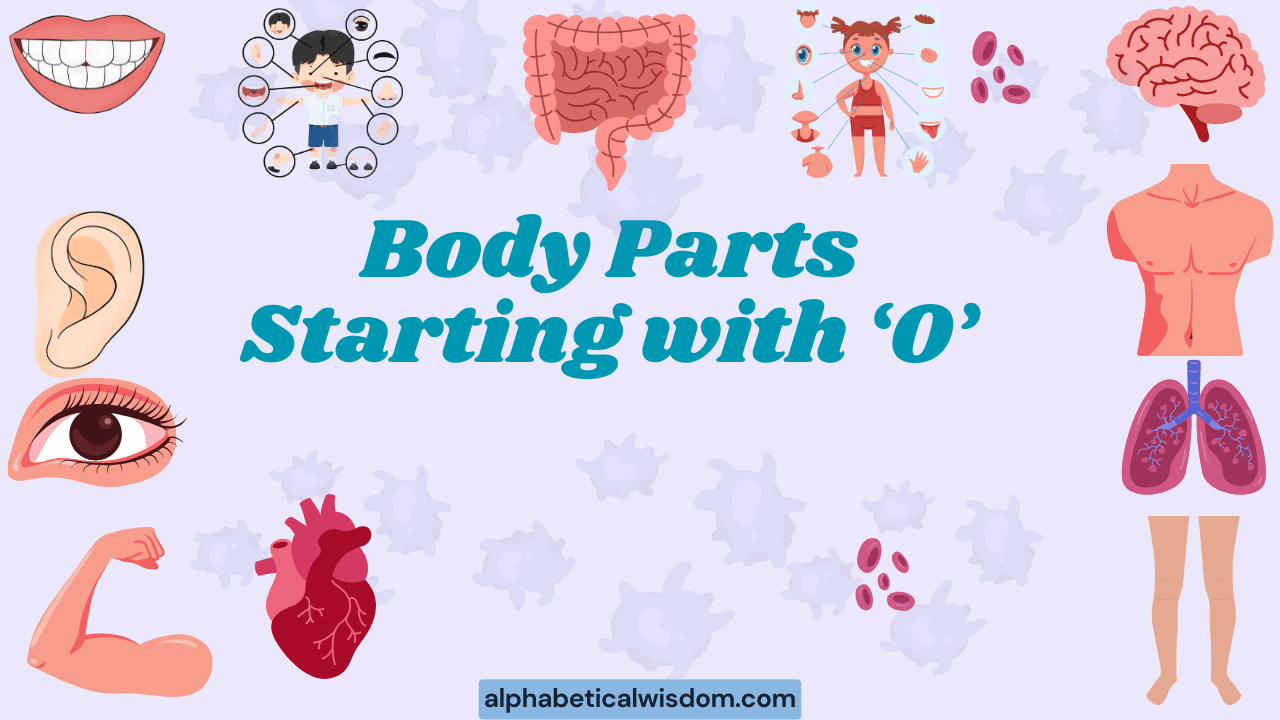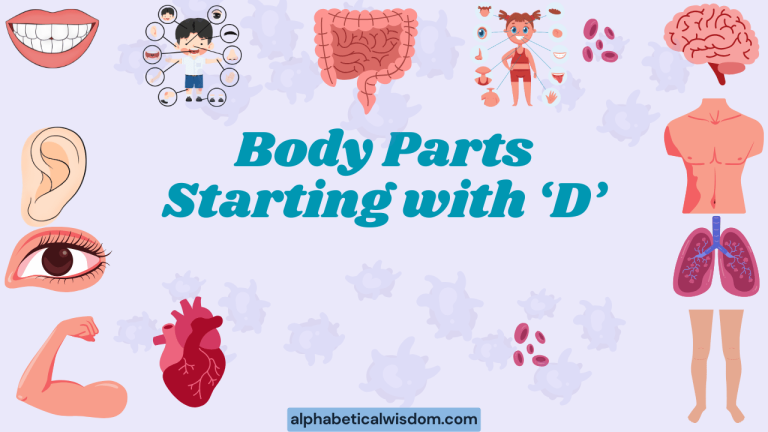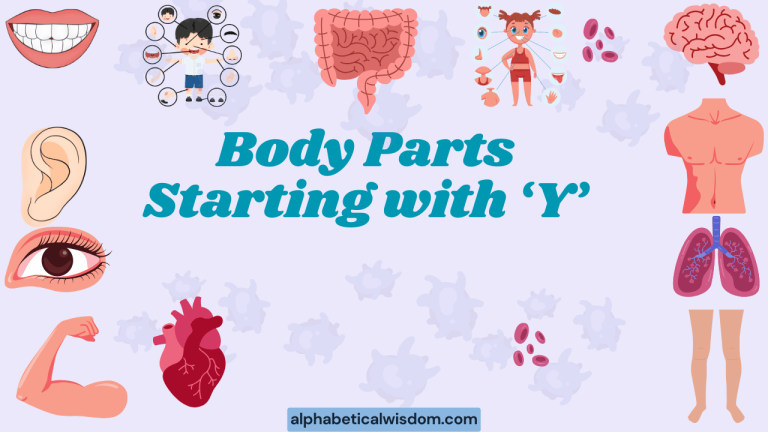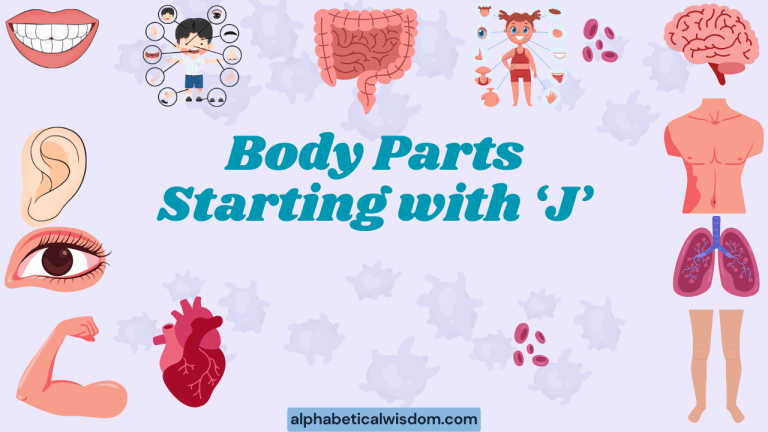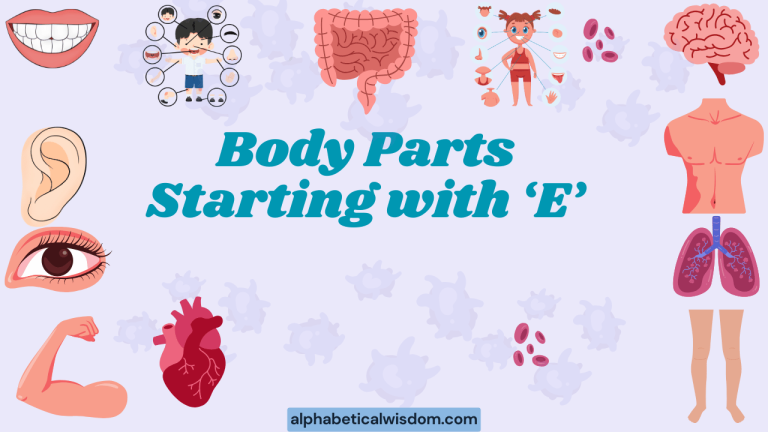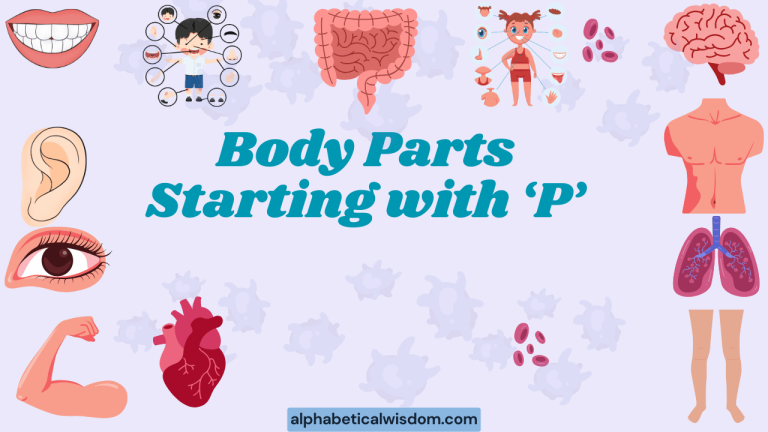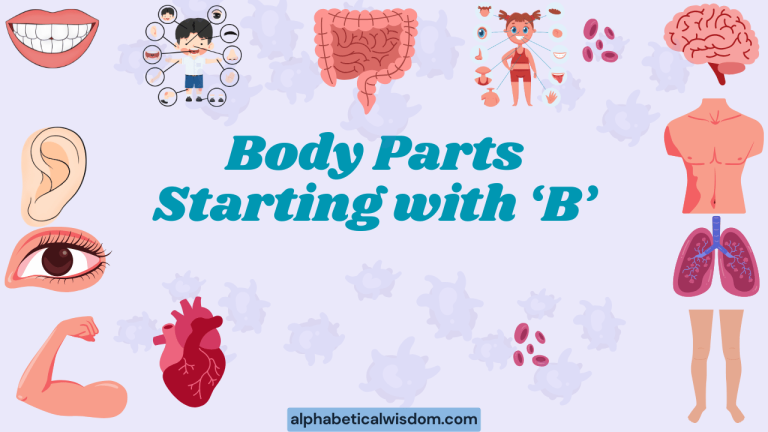Body Parts Starting with “O”: Grammar and Usage Guide
Understanding the proper use of nouns referring to body parts, especially those starting with the letter “o,” is crucial for clear and accurate communication in English. This article delves into the grammar and usage of such terms, clarifying their meanings, contexts, and common errors.
Whether you are a student learning English, a writer seeking precision, or simply interested in expanding your vocabulary, this guide provides a comprehensive overview to enhance your understanding and application of these terms.
From anatomical descriptions to everyday conversations, knowing how to use these words correctly is essential. This article covers definitions, structural aspects, variations, examples, usage rules, common mistakes, and practice exercises.
By mastering these concepts, you can improve your fluency and confidence in using English effectively.
Table of Contents
- Introduction
- Definition of Body Parts Starting with “O”
- Structural Breakdown
- Types and Categories
- Examples
- Usage Rules
- Common Mistakes
- Practice Exercises
- Advanced Topics
- FAQ
- Conclusion
Definition of Body Parts Starting with “O”
Body parts starting with the letter “o” are nouns that refer to specific components of the human anatomy. These can include both internal organs and external features.
Understanding their precise meanings and functions is crucial for effective communication, especially in medical, scientific, and everyday contexts. These nouns follow standard English grammar rules regarding singular and plural forms, possessive cases, and article usage.
The function of these body parts varies widely depending on the specific organ or feature. For example, the ovary plays a crucial role in the female reproductive system, while the omentum supports abdominal organs. The context in which these words are used also affects their interpretation. In medical settings, precision is key, whereas in casual conversation, the terms might be used more loosely or metaphorically.
Structural Breakdown
The structural breakdown of body part nouns starting with “o” follows standard English noun rules. They can be singular or plural, concrete or abstract (depending on their usage in idioms), and they can be modified by adjectives and used with articles.
The typical sentence structure involves these nouns acting as subjects, objects, or complements.
For instance, in the sentence “The omentum supports the abdominal organs,” the word “omentum” is a singular noun acting as the subject of the sentence. In “The doctor examined her ovaries,” the word “ovaries” is a plural noun acting as the direct object. Understanding these structural roles helps in constructing grammatically correct and meaningful sentences.
Types and Categories
Internal Organs
Internal organs starting with “o” are vital components of the human body, each serving specific functions. These organs are generally located within the body cavities and are essential for life processes such as reproduction, digestion, and immune response. The most common example is the ovary.
The ovary is a crucial organ in the female reproductive system, responsible for producing eggs and hormones like estrogen and progesterone. Another important organ is the omentum, a large fold of peritoneum that hangs down from the stomach and helps protect abdominal organs. Understanding the functions of these organs is vital in medical and biological fields.
Outer Body Parts
While less common, some outer body parts can be described using “o” words, especially in specific contexts or in anatomical descriptions. These terms might not be in everyday usage but are important in certain fields like dermatology or specialized medical descriptions. An example could be a description of an opening in the skin, though “opening” is not strictly a body part itself.
The term os, referring to an opening or mouth-like structure, can sometimes be used in a context related to the body, such as the external os of the cervix. This term is more prevalent in medical literature but fits the category of an outer body part or feature described with a word starting with “o.”
Examples
Examples with Internal Organs
The following table provides examples of sentences using body parts starting with “o” that refer to internal organs. These examples demonstrate the correct grammatical usage and contextual relevance of each term.
| Sentence | Body Part | Context |
|---|---|---|
| The doctor examined the patient’s ovaries during the ultrasound. | Ovaries | Medical examination |
| Hormone production in the ovaries declines with age. | Ovaries | Physiological process |
| The surgeon removed a tumor from the patient’s left ovary. | Ovary | Surgical procedure |
| The omentum plays a role in immune response within the abdomen. | Omentum | Biological function |
| Inflammation of the omentum can cause abdominal pain. | Omentum | Medical symptom |
| The omentum helps to isolate infections in the abdominal cavity. | Omentum | Protective mechanism |
| The cysts were found on both ovaries during the checkup. | Ovaries | Medical diagnosis |
| Estrogen is primarily produced by the ovaries in women. | Ovaries | Hormone production |
| The omentum is rich in fatty tissue and blood vessels. | Omentum | Anatomical description |
| She experienced pain in her lower abdomen due to an issue with her ovary. | Ovary | Health complaint |
| The doctor explained the function of the omentum during the consultation. | Omentum | Medical explanation |
| The health of the ovaries is crucial for reproductive health. | Ovaries | Health importance |
| The omentum can sometimes adhere to other abdominal organs. | Omentum | Surgical observation |
| Regular check-ups can help detect issues with the ovaries early. | Ovaries | Preventative care |
| The omentum is a part of the peritoneum. | Omentum | Anatomical classification |
| The patient was diagnosed with polycystic ovary syndrome. | Ovary | Medical diagnosis |
| The role of the omentum in wound healing is significant. | Omentum | Biological process |
| The doctor recommended further tests to assess the ovaries. | Ovaries | Medical recommendation |
| The omentum is sometimes referred to as the “abdominal policeman”. | Omentum | Descriptive term |
| She had surgery to remove a cyst from her ovary. | Ovary | Surgical procedure |
| The ovaries are essential for fertility. | Ovaries | Reproductive function |
| The omentum is a protective layer in the abdomen. | Omentum | Protective function |
| The ovaries produce important hormones. | Ovaries | Hormone production |
| The omentum can help to contain infections. | Omentum | Infection control |
| The health of the ovaries is important for overall well-being. | Ovaries | Overall health |
| The omentum is a fold of peritoneal tissue. | Omentum | Tissue type |
| The size of the ovaries can vary. | Ovaries | Physical characteristic |
| The omentum is located in the abdominal cavity. | Omentum | Location |
Examples with Outer Body Parts
The following table includes examples of sentences using “o” words to describe outer body features or related concepts. Note that these are less direct and more descriptive.
| Sentence | Body Part/Feature | Context |
|---|---|---|
| The wound had a small opening, which needed to be cleaned. | Opening (of a wound) | Wound care |
| There was a small opening in the skin after the surgery. | Opening (of a wound) | Post-operative care |
| The doctor examined the external os of the cervix. | Os | Medical examination |
| The os was slightly dilated during labor. | Os | Childbirth |
| The os of the cervix needs to be monitored. | Os | Medical monitoring |
| The patient reported a burning sensation around the opening. | Opening (of a wound) | Patient complaint |
| The opening was carefully stitched closed. | Opening (of a wound) | Surgical procedure |
| The opening in her skin was quite small, but painful. | Opening (of a wound) | Physical description |
| The os was fully dilated prior to delivery. | Os | Childbirth stage |
| Monitoring the os is crucial during labor. | Os | Medical monitoring |
| The doctor checked the os to assess progress. | Os | Progress assessment |
| The opening from the surgery has healed well. | Opening (of a wound) | Healing process |
| The opening was dressed to prevent infection. | Opening (of a wound) | Infection prevention |
| The surgeon closed the opening with sutures. | Opening (of a wound) | Surgical closure |
| The os dilation was measured in centimeters. | Os | Measurement |
| The doctor noted the condition of the cervical os. | Os | Medical observation |
| The os appeared healthy during the exam. | Os | Health assessment |
| The opening needs to be kept clean and dry. | Opening (of a wound) | Hygiene recommendation |
| The opening was covered with a sterile bandage. | Opening (of a wound) | Protective measure |
| The nurse inspected the opening for signs of infection. | Opening (of a wound) | Medical inspection |
| The condition of the os is always monitored during labor. | Os | Constant monitoring |
| The os was checked by the midwife. | Os | Medical check |
| The os opened slowly. | Os | Slow process |
| The opening on his arm was treated with antiseptic cream. | Opening (of a wound) | Antiseptic treatment |
| The opening on her knee was small but deep. | Opening (of a wound) | Wound description |
Examples in Medical Contexts
The following table provides sentences used specifically in medical contexts. These examples illustrate how body parts starting with “o” are used in healthcare settings.
| Sentence | Body Part | Medical Context |
|---|---|---|
| Oophorectomy is the surgical removal of one or both ovaries. | Ovaries | Surgical procedure |
| The patient underwent an oophorocystectomy to remove an ovarian cyst. | Ovary | Surgical procedure |
| An oophorectomy may be recommended in cases of ovarian cancer. | Ovaries | Treatment option |
| The doctor performed an omentectomy to remove part of the omentum. | Omentum | Surgical procedure |
| The omentum was biopsied to rule out metastasis. | Omentum | Diagnostic procedure |
| Ovarian cancer is a serious concern for women’s health. | Ovaries | Health concern |
| The ovarian follicles develop within the ovaries. | Ovaries | Anatomical description |
| The patient had an ovarian mass detected on ultrasound. | Ovaries | Diagnostic finding |
| The physician noted the condition of the cervical os. | Os | Medical observation |
| The cervical os was examined during the pelvic exam. | Os | Examination process |
| The dilatation of the cervical os was measured. | Os | Measurement during labor |
| The use of opioids post-surgery is common for pain management. | N/A | Pain management |
| The doctor prescribed opioids to help with the pain. | N/A | Prescription medication |
| Monitor patients carefully when prescribing opioids. | N/A | Medical monitoring |
| The opening of the surgical incision was carefully inspected. | Opening | Post-operative care |
| The surgical opening was covered with a sterile dressing. | Opening | Infection control |
| The doctor checked the surgical opening for signs of infection. | Opening | Medical check |
| The omentum was found to be adhered to the bowel during surgery. | Omentum | Surgical finding |
| Inflammation of the omentum can lead to peritonitis. | Omentum | Clinical condition |
| The omentum can help to wall off areas of infection in the abdomen. | Omentum | Protective mechanism |
| The ovaries are essential for the production of eggs. | Ovaries | Reproductive function |
| The ovaries are located in the pelvic cavity. | Ovaries | Anatomical location |
| The ovaries can be affected by hormonal imbalances. | Ovaries | Physiological impact |
Examples in Idiomatic Expressions
There are not many common idiomatic expressions directly involving body parts starting with the letter “o.” However, we can consider phrases that use related concepts metaphorically.
| Sentence | Explanation |
|---|---|
| To keep an open mind is crucial for learning new things. | “Open” here implies receptiveness and willingness to consider new ideas. |
| She has an open heart and is always willing to help others. | “Open heart” suggests kindness and generosity. |
| The opening remarks set the tone for the entire conference. | “Opening” refers to the beginning or start of something. |
| He saw an opening in the market and seized the opportunity. | “Opening” means an opportunity or chance. |
| The opening night of the play was a resounding success. | “Opening” refers to the first performance. |
| She is very outgoing and loves to meet new people. | “Outgoing” describes someone who is sociable and friendly. |
| The company’s outlook for the next quarter is positive. | “Outlook” refers to a forecast or perspective. |
| The outcome of the election was unexpected. | “Outcome” refers to the result of an event. |
| The onset of the illness was sudden. | “Onset” refers to the start of something, usually negative. |
| The offset of the costs was difficult. | “Offset” refers to compensating for something. |
Examples in Descriptive Writing
These examples showcase how words like “opening” can be used in descriptive writing to create vivid imagery.
| Sentence | Description |
|---|---|
| The opening in the forest canopy allowed sunlight to stream through. | Describes a gap in the trees through which light shines. |
| The opening notes of the symphony filled the concert hall. | Describes the beginning of a musical piece. |
| The opening scene of the movie immediately grabbed the audience’s attention. | Describes the start of a film. |
| The opening of the flower revealed its delicate petals. | Describes a flower blooming. |
| The opening of the secret passage was hidden behind a bookcase. | Describes the entrance to a hidden area. |
| The opening of the museum was a grand event. | Describes the inauguration of a museum. |
| The opening of the new bridge improved traffic flow. | Describes the inauguration of a new bridge. |
| The overture began with a flourish of trumpets. | Describes the introduction to an opera or musical. |
| The overabundance of food at the feast was overwhelming. | Describes a large amount of food. |
| The overcast sky created a gloomy atmosphere. | Describes a cloudy sky. |
Usage Rules
Singular and Plural Forms
Nouns referring to body parts starting with “o” follow standard English rules for singular and plural forms. For example, “ovary” is singular, while “ovaries” is plural.
The plural form is usually created by adding “-s” or “-es” to the singular form. Consistent use of the correct form is vital for grammatical accuracy.
For instance, it is correct to say “She has one ovary” (singular) and “Both her ovaries are healthy” (plural). Using the wrong form can lead to confusion and grammatical errors.
Possessive Forms
Possessive forms are used to show ownership or association. For singular nouns, add an apostrophe and “s” (‘s).
For plural nouns ending in “s,” add only an apostrophe (‘). For example, “the ovary’s function” (singular) and “the ovaries’ health” (plural).
Correct usage of possessive forms ensures clarity and avoids ambiguity. For example, “the omentum’s role” indicates the role belonging to the omentum. “The ovaries’ size” refers to the size of multiple ovaries.
Use of Articles
The use of articles (“a,” “an,” “the”) depends on whether the noun is specific or general. Use “a” or “an” for general references and “the” for specific references. For example, “She has an ovary” (general) and “The ovary on the left side is larger” (specific).
When referring to body parts in a general sense, no article may be needed. For example, “Ovaries are essential for reproduction.” The correct use of articles enhances clarity and precision in communication.
Common Prepositions
Common prepositions used with body parts starting with “o” include “in,” “on,” “of,” and “to.” The specific preposition depends on the context. For example, “a tumor on the ovary,” “the function of the omentum,” “pain in the area of the ovaries,” and “related to the omentum.”
Choosing the correct preposition is crucial for conveying the intended meaning. For instance, “a problem with the ovaries” indicates an issue affecting the ovaries. Being mindful of preposition usage ensures accurate and clear communication.
Common Mistakes
One common mistake is using the singular form when the plural is needed, and vice versa. For instance, saying “She has two ovary” instead of “She has two ovaries.” Another mistake is using the wrong possessive form, such as “the ovaries’s health” instead of “the ovaries’ health.”
Incorrect article usage is also a common error. For example, omitting “the” when referring to a specific body part, such as saying “ovary was removed” instead of “The ovary was removed.” Finally, using the wrong preposition can lead to confusion. For example, saying “pain on the ovaries” instead of “pain in the ovaries.” The table below shows correct and incorrect examples.
| Incorrect | Correct | Explanation |
|---|---|---|
| She has one ovaries. | She has one ovary. | Singular form required. |
| Both her ovary are healthy. | Both her ovaries are healthy. | Plural form required. |
| The omentum’s role are important. | The omentum’s role is important. | Singular possessive requires singular verb. |
| The ovaries’s health is crucial. | The ovaries’ health is crucial. | Plural possessive requires only an apostrophe. |
| Ovary was removed. | The ovary was removed. | Specific reference requires “the.” |
| She has ovary. | She has an ovary. | General reference requires “an.” |
| Pain on the ovaries. | Pain in the ovaries. | Correct preposition usage. |
| Related with the omentum. | Related to the omentum. | Correct preposition usage. |
| She had a oophorectomy. | She had an oophorectomy. | “Oophorectomy” starts with a vowel sound, so “an” is appropriate. |
Practice Exercises
Exercise 1: Fill in the Blanks
Fill in the blanks with the correct form of the body part starting with “o.”
| Question | Answer |
|---|---|
| The doctor examined her ________ during the check-up. (ovary) | ovaries |
| The ________ plays a role in immune response. (omentum) | omentum |
| She had pain in her left ________. (ovary) | ovary |
| The ________ helps to protect abdominal organs. (omentum) | omentum |
| Both ________ are essential for reproduction. (ovary) | ovaries |
| The surgeon removed a cyst from her ________. (ovary) | ovary |
| The ________ is rich in fatty tissue. (omentum) | omentum |
| Hormone production occurs in the ________. (ovary) | ovaries |
| The ________ is a fold of peritoneum. (omentum) | omentum |
| The health of the ________ is important for overall well-being. (ovary) | ovaries |
Exercise 2: Correct the Errors
Identify and correct the errors in the following sentences.
| Question | Answer |
|---|---|
| She has one ovaries. | She has one ovary. |
| Both her ovary are healthy. | Both her ovaries are healthy. |
| The omentum’s role are important. | The omentum’s role is important. |
| The ovaries’s health is crucial. | The ovaries’ health is crucial. |
| Ovary was removed. | The ovary was removed. |
| She has ovary. | She has an ovary. |
| Pain on the ovaries. | Pain in the ovaries. |
| Related with the omentum. | Related to the omentum. |
| The omentum is on the abdomen. | The omentum is in the abdomen. |
| She will have a operation on her ovary. | She will have an operation on her ovary. |
Exercise 3: Sentence Construction
Construct sentences using the given body part starting with “o” in the specified context.
| Body Part | Context | Example Sentence |
|---|---|---|
| Ovaries | Medical examination | The doctor checked the patient’s ovaries during the physical exam. |
| Omentum | Surgical procedure | The surgeon carefully repositioned the omentum during the operation. |
| Ovary | Health condition | She experienced discomfort due to a cyst on her left ovary. |
| Omentum | Anatomical description | The omentum is a large, fatty layer that covers the abdominal organs. |
| Ovaries | Hormone production | The ovaries are responsible for producing estrogen and progesterone. |
| Opening | Wound description | The opening on his arm was small, but required stitches. |
| Ovaries | Reproductive health | Healthy ovaries are crucial for fertility. |
| Omentum | Immune function | The omentum plays a role in fighting infections in the abdomen. |
| Os | Labor and delivery | The doctor checked the dilation of the cervical os. |
| Ovaries | Medical diagnosis | Polycystic ovary syndrome can affect a woman’s fertility. |
Advanced Topics
Medical Terminology
In medical terminology, prefixes and suffixes are often combined with root words to create specific terms related to body parts. For instance, “oophor-” refers to the ovary, and “-ectomy” means surgical removal.
Therefore, “oophorectomy” means the surgical removal of one or both ovaries. Understanding these components can aid in deciphering complex medical terms.
Familiarity with medical terminology is essential for healthcare professionals and students in medical fields. This knowledge enables them to communicate accurately and understand medical literature effectively. Other examples include oophoritis (inflammation of the ovary) and omentocele (hernia containing the omentum).
Figurative Language
While less common, body parts starting with “o” can be used metaphorically or figuratively in literature and everyday speech. For example, describing someone as having an “open heart” suggests kindness and generosity.
These usages add depth and nuance to communication.
Understanding figurative language enhances the ability to interpret literature and engage in creative writing. For instance, an “opening” can metaphorically represent an opportunity or a new beginning.
Recognizing these figurative uses enriches comprehension and expression.
FAQ
- What is the function of the omentum?
The omentum is a large fold of peritoneum that hangs down from the stomach and helps protect abdominal organs. It plays a role in immune response, isolating infections, and supporting abdominal organs by supplying them with blood and lymphatic vessels. Additionally, it contributes to wound healing and can adhere to other abdominal structures in cases of inflammation or injury.
- What is an oophorectomy?
An oophorectomy is a surgical procedure involving the removal of one or both ovaries. It is often performed to treat conditions such as ovarian
- What is the clinical significance of the cervical os?
The cervical os is clinically significant because it plays a crucial role in childbirth. The dilation (opening) of the cervical os is monitored during labor to assess the progress of delivery. The condition of the os can also indicate various gynecological conditions, such as infections or abnormalities.
- How are issues with the ovaries typically diagnosed?
Issues with the ovaries are typically diagnosed through various methods, including physical examinations, ultrasound imaging, blood tests (to check hormone levels), and in some cases, biopsies. These tests help identify conditions such as ovarian cysts, tumors, or hormonal imbalances that may affect ovarian function.
- What are some common conditions that affect the omentum?
Common conditions that affect the omentum include omentitis (inflammation of the omentum), omental cysts, and omental tumors. Additionally, the omentum can be involved in the spread of abdominal cancers, as cancer cells can metastasize to the omentum. Adhesions and torsions can also affect the omentum, leading to pain and other complications.
- Can lifestyle factors influence the health of the ovaries?
Yes, several lifestyle factors can influence the health of the ovaries. These include diet, exercise, stress management, and avoiding smoking and excessive alcohol consumption. A balanced diet rich in essential nutrients, regular physical activity, and effective stress management techniques can promote hormonal balance and overall ovarian health. Additionally, avoiding exposure to environmental toxins can help protect ovarian function.
Conclusion
Understanding the grammar and usage of body parts starting with “o” is essential for clear and accurate communication, particularly in medical and scientific contexts. By mastering the definitions, structural aspects, variations, examples, usage rules, and common mistakes associated with these terms, you can enhance your fluency and confidence in using English effectively.
This guide provides a comprehensive overview, covering everything from internal organs like the ovaries and omentum to outer body features and related concepts. Through examples, exercises, and advanced topics, you can refine your understanding and application of these terms, ensuring precision and clarity in both written and spoken language.
Whether you are a student, writer, or healthcare professional, this knowledge will contribute to more effective and accurate communication in various settings.
